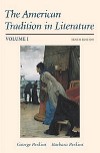Benjamin Franklin, printer of Philadelphia, stands alone as the quintessential American: educator, publisher, diplomat, scientist, musician, statesman, inventor, and good citizen. No other American before or since his time has risen to the public acclaim and the wide-ranging level of achievement as did this "self-made man." Among students familiar with his literature, Franklin is best known for his famous Autobiography, a composition written throughout three different periods of his life, and dedicated to his son, William. In it Franklin analyzes the critical moments of his career and characterizes the society that he loved and served for so long. Born to the son of a candle maker in Boston, the young Franklin picked up the printing trade beside his older brother, James, and when the latter was imprisoned for a short time for libel, Benjamin took over management of the shop and, under the assumed name "Silence Dogood," continued the satirical editorials for which the shop was renowned. Later, in Philadelphia, following two years in London, Franklin was to become perhaps the most respected and popular-not to mention the wealthiest-printer in the colonies. He made fortunes with lucrative contracts with the Continental Congress, the publication of "Poor Richard's Almanac," and with his newspaper, "The Pennsylvania Gazette." So profitable were his business ventures that Franklin was able to retire from employment at the age of 48 and to devote the rest of his life to his explorations, experiments, public service, and statesmanship. Franklin's leadership was recognized early on, and he was selected repeatedly by the leaders of Pennsylvania for service in various enterprises. He helped negotiate a peace treaty with the Ohio Indians, served as clerk of the Pennsylvania Assembly, was appointed as the colonies' diplomat to England where he spoke eloquently on behalf of the colonial issues, and as the young nation's Ambassador to France, negotiated the Treaty of Alliance in 1778 and later, with John Jay and John Adams, signed the Treaty of Paris which finalized the separation of the colonies from all control of England and Europe. Like many intellectuals of the eighteenth century and many of the United States' "founding fathers," Franklin found comfort and confidence in the principles of rationalism, empirical analysis, and the religious skepticism of the period. Doubting the various claims of divine revelation and intervention as well as the collected body of alleged miracles, Franklin embraced the Deism of Shaftsbury and Locke, more a set of assumptions about the nature of the universe and human kind's place within it than a body of particular faith. Deism spurned mysticism, doctrine, and religious piety in favor of confidence in the humanitarian and social architect. Many of Franklin's gifts to humanity today are almost taken for granted as ordinary fixtures of any American community. He founded the first intellectual society, the American Philosophical Society, the forerunner of thousands of "think tanks" around the world. He organized the first street cleaning service, the first postal system, the first circulating library, and the first volunteer fire department. A songwriter and an accomplished musician, Franklin played the violin, the viola, the cello, the guitar, and the harpsichord. He invented the lottery, the "American" harmonica, bifocal lenses, and the "Franklin stove." He charted the Gulf Stream, investigated the relationship between lightening and electricity, wrote essays on public health and paleontology, and published the German Zeitung, the first non-English newspaper in the colonies. In John Adams tribute to his colleague and contemporary, the second United States President recognized Franklin as the single-most renowned person of the European and American continents. And so he was. |



 2003 McGraw-Hill Higher Education
2003 McGraw-Hill Higher Education